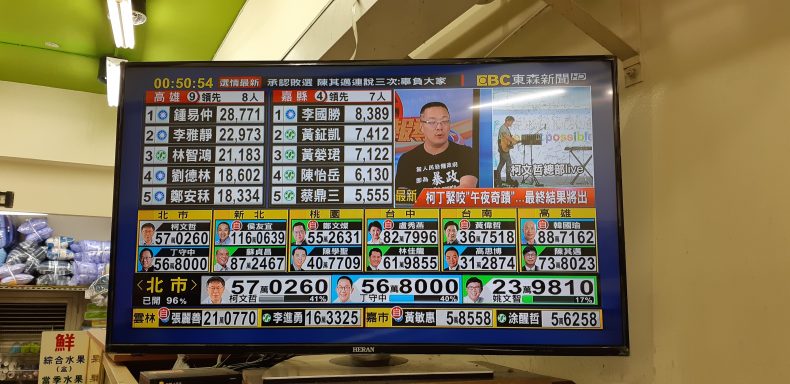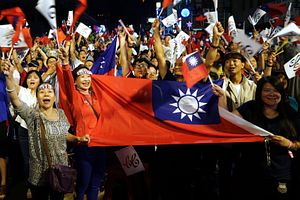Taiwan’s ruling Democratic Progressive Party (DPP) was handed a rebuke in the island’s 2018 midterm elections on Saturday, with voters showing widespread dissatisfaction with the party’s handling of affairs over the past two years. The DPP, which had seen significant victories since Taiwan’s 2014 midterms, lost heavily on November 24, losing in seven of the 13 counties and cities up for grabs. Particularly devastating were the series of defeats suffered in the island’s south, the traditional stronghold of the DPP.
President Tsai Ing-wen, who rode the 2016 wave into the island’s highest office, tendered her resignation as chairperson of the DPP in a hastily assembled press conference over the weekend (she will, however, remain as president). Her premier, William Lai, also offered his resignation but Tsai has asked for him to continue at his post.
Meanwhile, the opposition Kuomintang (KMT) secured several key victories, including taking several counties and cities in the island’s south, a region considered the heart of DPP territory.
In the immediate aftermath of the election many Taiwanese have been preoccupied with the implications. The KMT, born on the Chinese mainland, generally takes a softer stance on cross-strait relations than the pro-independence DPP. Taiwan’s Mainland Affairs Council (MAC), which manages cross-strait relations with China, issued a statement warning against Beijing unilaterally interpreting the elections as a sign the Taiwanese seek unification with the People’s Republic. The MAC instead highlighted the results of the midterm as a symbol of the robust democratic institutions enjoyed by the Taiwanese.
The results of the election came as a surprise to both parties. In politics the only poll numbers that matter are the ones on election day; however, figures had indicated that the DPP still holds an advantage over the KMT. Past KMT policies have hurt Taiwan’s economy, and those who identify as Taiwanese view the party as being too pro-China at times.
Nevertheless, some Taiwanese have expressed concerns over the weekend that the midterms indicate an island-wide swing back toward a KMT agenda. DPP policy over the past two years has not been effective enough to convince Taiwan’s civil society they have domestic issues under control, and individually many Taiwanese feel left behind as the DPP has pursued lofty goals. The past two years of DPP government in Taiwan have been defined by three larger trends: the New Southbound Policy, an attempt to establish stronger linkages with southeast Asia as a means to pull Taiwan out of China’s orbit; domestic fiscal reforms, including addressing the stalled economy and looming pension crisis; and a move toward progressive policies and ideology, including legalization of gay marriage and halting nuclear power plants.
A set of referendum items up for vote during the midterms may indicate the dissatisfaction with the perceived lack of attention paid to grounded issues. Items championed by Taiwan’s progressives were rejected. However the government is only legally bound to act upon one of the referendums, according to the Taipei Times, with the overturning of phasing out nuclear power having reached the necessary 25 percent threshold. The central government can opt to not act upon other items.

Election night coverage plays on a television in a general store in Taipei. At nearly 1 in the morning the ballots for Taipei’s mayoral race were still being counted. Photo by James X. Morris.
Some DPP lawmakers could see the loss coming. In March the Taipei Times reported that lawmakers felt the unbalanced way in which the party handled private sector and public sector pension cuts would place them at a disadvantage.
The two mayoral races to make news were those in Taipei and Kaohsiung. In Taipei, incumbent independent mayor Ko Wen-je eked out an apparent victory over KMT candidate Ting Shou-chung. Ting has filed for a recount, citing irregularities in voting. Polls closed at 8 pm in Taipei on Saturday, but ballots were still being counted until nearly 3 am Sunday. In Kaohsiung, the heart of DPP territory, KMT outsider politician Han Kuo-yu rode to victory as a dark horse candidate. Supporters attributed his victory to dissatisfaction with the Tsai administration as well as his combination of grassroots politics and social media events.
It is clear the DPP suffered a major defeat; however, the party remains in control of the central government until elections in early 2020. It received a severe rebuke from the voters, but it is not out of power. That is to say, the DPP is in a position to realign its policy with society, learn from its mistakes, and tailor its message. The DPP’s loss could be an indicator of things to come, though it is more likely a chastisement than a KMT political insurgency.
The 2018 midterm elections were a referendum on DPP policy more than anything. However, the inflow of fresh young candidates in both camps was recognition that neither party has had a popular central government in the past several election cycles (the KMT was dumped in 2014 and 2016, much as the DPP was shellacked this year). Now, both parties, surprised by the midterm results, must embark on a re-evaluation of policy, ideology, and candidates. The parties must attempt an image makeover, entering new frontiers, and offering new substance.
Tsai had called a vote for the KMT a vote against democracy, but now the DPP has learned they cannot assume past election trends will give them an easy run in the future. The run-up to 2020 looks to be a long, brutal, high-stakes fight.

































